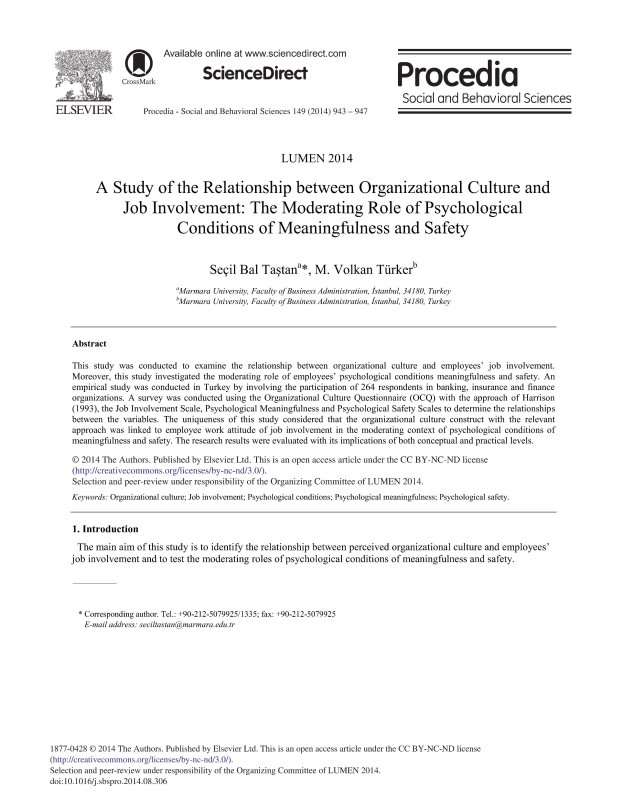Job Attitudes in the Insurance Industry
The insurance industry has forever been notorious for having “slimy salespeople” and an absurdly high turnover rate. Inside the industry, the world of insurance sales is a faced-paced job with a large amount of pressure coming from above in regards to sales performance and generating new or prospective business. These few factors and many others have a large impact on the individual in the insurance agent position. This correlates directly to the insurance agent’s job attitude, which can affect other factors of job performance among other things.
The findings that I made in my interviews and personal experience with Farmers Insurance may surprise those who are not familiar with the inner workings of insurance companies. In general, the infamous high-turnover issue that Farmers and the rest of the industry suffer from is getting worse. There is a unique dynamic between new hires and what are called “top producers” for the company, and the way that Farmers Insurance is geared towards each type of insurance agent.
In this paper, I will go over my findings and recommendations for moving forward in relation to job attitudes at Farmers Insurance, especially in the insurance agent position. I interviewed several individuals at Farmers Insurance to gain some perspective from current employees on the inside. Additionally, I will go over what Farmers Insurance is doing in regards to job attitude and performance-driving, and how it actually affecting the individual insurance agent. After that, I will dive into my recommendations for the company, as well as a few for prospective employees, and seasoned veterans in the insurance industry alike.
Farmers Insurance is a large label insurance company that most everyone has heard about through commercials and other means of advertising. Farmers is perennially in the top 3 insurance carriers in the United States and is frequently in the #2 spot. Farmers Insurance is actually the marketing name of the company and is, in reality, a group of insurance companies that write policies for different forms of risk. In addition to the varying companies under the umbrella of Farmers Insurance, agents frequently sign as producers for companies outside Farmers so they can write insurance products that are not written by any of the Farmers Insurance companies.
I collected information by interviewing previous coworkers, as I have worked for Farmers Insurance in varying capacity before this assignment. I reached out through conventional means to set up a lunch or coffee meetup, as to help make the interviewee comfortable. I made it clear that all information that I gathered would be maintained as confidential as to not have any retaliation by Farmers Insurance as a result of any information that they gave me.
The interviewees were of varying age, from mid to late 20’s to early 60’s. All interviewees had the title insurance agent, although the insurance agent wears many hats when doing business. The majority gender was male, with only one female interviewee. Most tenures averaged 3-5 years, with one tenure reaching 40 years. This industry is predominantly male, although female agents have as much or more success as male agents in some cases. Insurance success is highly variable on your personality and influencing skills, and there is blatant age discrimination among clients and prospects of insurance agents.
Farmers Insurance hires agents most often on a commission-only package with no base salary. For three years in a row, they have lowered the base percentage commission for each line of business, the main ones being Auto, Home, Life, and Commercial. This greatly impacts the salary of an insurance agent, as they need to produce a significantly larger amount of new business to reach the same amount of income that they previously had. However, Farmers Insurance has increased the incentives for having high “agency standards”, with letter grades for different benchmarks for each standard ranging from D to AAA. They increased bonuses for being at an “AAA” standard by about 25%, and “AA” by about 12%. While this is a great change for insurance agents that are already producing at their best, this greatly hinders the incomes of agents that are just starting out, or even have been producing well for a few years. Having an AAA or AA rating for your agency is a very difficult task, and can only realistically be attained by an insurance agent that has administrative employees and insurance producers working under them.
The reason that this is not ideal, is that it stifles new talent and people looking to get into the insurance industry. First, you have to learn the ins-and-outs of the insurance business and its products, to be able to write products correctly and avoid policy cancellations due to the policy being incorrect, or not the right type of risk. Secondly, you have to build a network of customers which is done primarily through cold-calling potential prospects at their home. This is purely a numbers game, and it is near impossible to know what type of customer that you are gaining. Part of the agency rating does depend on customer quality, and what type of insurance policies you are writing. Both of these things are very difficult to achieve early on in your insurance career, because of how prospecting is done primarily in the business, i.e. cold calling.
While this drives the top producers of new business for the company even further, this strategy that Farmers Insurance has incorporated has been received negatively by most of their employees. It encourages middle of the pack insurance agents to improve to AA and AAA, which is good for the company as a whole by increasing the general quality of its customers and products sold. However, it is very difficult to achieve AA and AAA ratings, and the only way to recoup losses caused by lowered commission is to write significantly more policies or improve your agency rating.
Interviews
In my interviews with current insurance agents at Farmers Insurance, I found that the agents on average had a lower commitment level to both Farmers Insurance and their day-to-day tasks because of these changes in pay structure.
Edwards and Bell (2008) found a statistically significant positive relationship between overall satisfaction and task performance… Fu et al. (2011) reported that facets of job satisfaction (pay, coworker, supervision, and work itself) had a significant impact on organizational commitment. A meta-analysis on [sic] studies over the past 25 years across 14 countries (Jaramillo et al. 2005) indicated that the relationship between organizational commitment and job performance is positive and stronger for sales employees than for non-sales employees. (Fu, 2014).
As a direct result of the shift in pay from commission to agency bonuses, there is a clear link between both their organizational commitment to Farmers Insurance and their job satisfaction. When asked “How satisfied are you with your job?” interviewees responded on a scale of 1-5. The average response was a 3, with newer insurance agents at the low end, and more veteran agents at the top end, with no responses at a 5. For “How satisfied are you with your pay?” responses averaged at a 2, with most agents regardless of tenure showing low levels of satisfaction. The question “Do you get paid enough for what you do?” resulted in an overwhelming “No”, showing a clear connection between job satisfaction and pay satisfaction.
When asked “Do you feel like part of a large whole, or do you feel more like an individual working on a company’s behalf?” with the follow-up question “Do you like (Their answer)?” the answer was always on the side of an individual working on the company’s behalf. The answer to the follow-up question was, in fact, they did like that they felt more like an individual. This is because they felt more in control of their day-to-day activities and thus more like their own boss. “How important do you feel you are to the company, and to its success?” had varied responses, and had a strong correlation between their agency rating and tenure having positive responses compared with agents with less tenure and a lower agency rating who did not feel as meaningful to the success of the company.
There is also found to be significant positive relationships among perceived organizational culture, job involvement, and psychological conditions of meaningfulness and safety. The psychological meaningfulness is observed to have higher correlation with the job involvement (r=0.402) then the psychological safety (r=0.212). In addition, when psychological meaningfulness was introduced, the explanatory power of the model increased significantly and this result confirmed its moderating effect on the positive relationship between organizational culture and job involvement. That is, if the employees perceive and experience their work as meaningful, they should facilitate their personal growth, contribution commitment, and job involvement (Hackman & Oldham, 1980; Bellah et al., 1985; Spreitzer et al., 1997; May et al., 2004). (Lumen, 2014)
It felt that in the interviews, the more recent changes that Farmers Insurance has made to its pay structure has negatively affected both organizational commitment and job satisfaction, as partially a result of “psychological meaningfulness” being reduced by their actions. Job commitment has lowered visibility, which in turn has lowered satisfaction levels across the board. I asked interviewees if in previous years they were more committed to Farmers Insurance and their role in general, and got a unanimous “Yes”. Interesting to note, however, the answers to “How committed are you to your community and its members?” and “Has that commitment level increased, decreased, or stayed the same compared to previous years?” showed an uptick in commitment to their community members, especially amongst agents that had less tenure.
I had an interesting response to the question “How much variety is there in your job?”. I got differing opinions, even though each interviewee had the same job title of an insurance agent. Some individuals felt that they were being forced to pivot to areas of lesser expertise in hopes of improving the diversification of sales, and muddling their role clarity as a result of pay structure pushing agency improvement. A study of “Predictors of Job Satisfaction Among Peer Providers on Professional Treatment Teams in Community-Based Agencies” measured role clarity as a predictor of job satisfaction.
Role clarity was a significant predictor of job satisfaction among peer providers, which demonstrates that, like employees in other studies, peer providers experienced job satisfaction as a benefit of role clarity. However, peer providers benefited from role clarity in unique ways because of the complexity of their role and identity in the organization. (Davis, 2013)
In this study, they were researching peer providers who as stated have a complex role and identity in their organization. Similarly, insurance agents have a complex role within any company in the insurance industry. The forced behavioral changes that result from the pay structure changes visibly reduced agent’s role clarity and in turn also reduced their overall job satisfaction.
Another reason that I found that organizational commitment and job satisfaction was low is that in general the interviewees felt that Farmers’ goals were unachievable for most agents. The consensus was less than the top 5% of agencies could reach AAA in a given year. Even the oldest agent with both the longest tenure and consistently in the top 3 producers in the state only had an agency rating of B, which is 3 levels below AAA. Although a bonus of 25% or even 12% is very appealing, most agencies got a 5% bonus or less, which was less than what they were making with reduced bonuses and a higher base commission.
Findings Overview
Overall, what Farmers Insurance has done in regards to their payment structure is really hurting the majority of their employees. Furthermore, new hires are less inclined to join as an agent because of the reduced base commission, and more inclined to join as a producer for another agent. The downside to that is they end up possibly making a base salary with further reduced commissions, and if they decide to become their own agent, they will have to start their book of business from scratch with zero renewals after years of work (Sometimes 30% of an agent’s income). There are a few improvements that Farmers Insurance could make to have a more competitive pay structure to the average agent, and still, maintain a higher standard for their employees and the customers that they write insurance policies for.
The interviewees that I spoke with had a generally reduced organizational commitment and job satisfaction to previous years. A major driving factor behind this is the change in the pay structure that Farmers Insurance has laid out. A study lead by economists on job satisfaction and the classic agency model had this to say:
This study uses job satisfaction as a measure of on-the-job utility in order to contrast a sorting model with rent capture from the classic agency model. In the latter, the workers retain no rents. The additional earnings they receive from performance pay exactly offsets the utility lost from being subject to earnings risk and from exerting effort. Thus, workers should receive the same utility in each sector and after controlling for earnings, those receiving performance pay should have lower utility. Instead, our empirical results suggest higher job satisfaction for those receiving performance pay both in the simple comparisons and the parsimonious regressions. Once earnings, and ultimately many other controls, are included, this advantage becomes insignificantly different from zero. In none of our estimations, can we find lower job satisfaction for those receiving performance pay.(Cornelissen, 2011)
Using the language of this study, what Farmers Insurance did is reduce the performance pay across the board, and increased bonus pay for the top 5-15%. Results from this study suggest that there is a significant correlation between job satisfaction and employees that are receiving performance pay, which is the only way outside of renewals and bonuses that an insurance agent can receive income. Cornelissen and his group found that there is absolutely no downside using a performance pay structure.
First Recommendation
Especially in the world of insurance, the floor for a new hire is as low as it can get. There is an extremely low risk associated with hiring a new insurance agent, as you are only providing overhead costs for the agent, and you are paying them once they make a sale (100% commission salary). Conversely, there is an infinite ceiling for new agents because of the hypothetically immeasurable amount of revenue that they can bring your business, while you still only incur typical overhead costs.
My first recommendation would be for Farmers Insurance to increase their performance based pay or commission structure. Every year for the past few years, they have reduced commission on every single product that they sell. They need to replace or repair their current performance-based pay system because it is not giving new and even long time existing agents the chance to grow as they used to.
If they were to repair their current system, they should shift away from having such a top-heavy agency rating bonus system. Alternatively, they could change the criteria that they hold the agencies to, and change the requirements to be an AA or AAA agency. For example, instead of requiring complete diversification of products in their book of business, they could make AA at least by producing very well in one or two areas of insurance, because they may lack the experience or resources to produce in every area of insurance.
If they were to replace the current system, I would recommend that they start comparing how they are paying their agents now to how they were compensating their agents when Farmers Insurance was doing its best. Sadly, Farmers has been underperforming their expectations for two years in a row. Looking back on how they were successful previously would be a good starting point to build a new platform for a more performance-based pay structure.
We also isolate the role of risk tolerance in the sorting model. The model predicts that it should matter only among those receiving performance pay and should do so with or without controlling for earnings. Indeed, we confirm this prediction using the unique risk tolerance variable. Greater risk tolerance is a strong positive determinant of job satisfaction among those receiving performance pay but plays no role among those not receiving performance pay. (Cornelissen, 2011)
This is especially relevant because a prospective insurance agent would need to naturally have a higher risk tolerance. Taking on a position that is 100% commission is a gutsy move when you require a steady income to feed your family and pay your mortgage. Since this is true for new insurance agents in most cases, Farmers Insurance is not taking full advantage that they have with their natural workforce personality traits. If they increased base commission, it would further encourage these high-risk high-reward personalities to flourish produce as much as possible. This would make more money for Farmers in the long run.
There is no reason that Farmers Insurance can’t have it both ways, encouraging a higher standard of quality both for their agents and their customers, and encouraging growth for agents who are starting out or may have been with the company for a while. Their structure needs change, one way or another. The alternative is to lose commitment to the company, have decreased job satisfaction, and have an overall negative job attitude for their employees. This can lead to an increase in absenteeism and an even higher than the industry standard turnover rate.
Second Recommendation
My second recommendation is that Farmers Insurance changes the way that they write policies, to make it more profitable for them. In turn, they could increase cash flow to their employees, increasing their attitudes towards their jobs. They could decrease spending in other ways as well, decreasing advertising spending, or decreasing other overhead costs.
There is a very material downside to this recommendation nevertheless. Changing how they write policies to increase profitability can alienate current and prospective customers, and can cause agents to lose business. Reducing spending on advertising can reduce incoming business as well, which again could cause agents to lose prospective business due to either not knowing that Farmers Insurance exists (unlikely) or not thinking to compare quotes that they get from competitors with Farmers Insurance.
Reducing overhead is an easy solution to put forth, but much harder to execute in practice. The only ‘easy’ way to reduce overhead is to reduce company trips and conventions, flying in agents to take classes or listening to a famous speaker. Even then, that comes at a cost that is not so obvious to the individual agent. Reducing overhead could include reducing the number of corporate IT support staff, for example, thus making for longer wait times when an agent runs into a technical problem. Also, it could hurt the customer, by having a smaller available staff for fielding calls about new insurance claims, some of which could be emergencies.
In regards to this recommendation, I would personally use it as a supplement to another solution. Reducing overhead marginally would help increase the profitability of the company, and could benefit both their customers and their employees. There is great risk in reducing overhead too much nonetheless, as doing so could result in the issues states above or other unforeseen complications that would be harder to fix than it would be to cause.
Recommendation Overview
All in all, I think that Farmers Insurance should deeply consider the first recommendation, and also make sure to implement some of the second recommendation. From my talks with the interviewees, I asked their opinions on both of these recommendations to help fix the pay structure problem Farmers faces. The feedback that I got was in line with the research that I had done in regards to this issue. Instigating these recommendations would greatly increase the general moral of the company employees, and encourage good agents to stay with the company.
Farmers Insurance faces a real problem. They have employees that are losing faith in the company and its direction. This is clearly evidenced by multiple interviews with current employees of the company, varying in age, tenure, and gender. When Farmers is not meeting expectations of growth as a whole and reducing the amount that they pay their agents overall, it paints a bleak outlook for their future. Farmers Insurance needs to encourage growth. Their products and underwriting processes already hold a standard for the type of policy and risk they are willing to take on, and that is not the problem that they need to address, as they currently are. The company is turning away potential top agents for little to no risk, just because they are not paying employees like they used to. Additionally, this issue is causing current agents job dissatisfaction and they are having a downward trend in organizational commitment. Rebalancing the way that they compensate their agents is an inevitability. Farmers Insurance needs to change their pay structure in order to attract new top talent, and keep their current talent or it will move to whatever suits it best.
Cornelissen, T., Heywood, J. S., & Jirjahn, U. (2011). Performance pay, risk attitudes and job satisfaction. Labour Economics, 18(2), 229-239. doi:10.1016/j.labeco.2010.09.005
Davis, J. K. (2013). Predictors of job satisfaction among peer providers on professional treatment teams in community-based agencies. Psychiatric services (Washington, D.C.), 64(2), 181. doi:10.1176/appi.ps.001452012
Eriksson, T. (2008). Performance-pay, sorting and social motivation. Journal of economic behavior & organization., 68(2), 412-421. doi:10.1016/j.jebo.2007.10.003
Fu, W., & Deshpande, S. (2014). The Impact of Caring Climate, Job Satisfaction, and Organizational Commitment on Job Performance of Employees in a China’s Insurance Company. Journal of Business Ethics, 124(2), 339-349. doi:10.1007/s10551-013-1876-y
Hojat, M., Kowitt, B., Doria, C., & Gonnella, J. S. (2010). Career satisfaction and professional accomplishments. Medical education, 44(10), 969. doi:10.1111/j.1365-2923.2010.03735.x
Lee, H.-Y., Park, S. E., Park, E.-C., Hahm, M.-I., & Cho, W. H. (2008). Job satisfaction and trust in Health Insurance Review Agency among Korean physicians. Health policy (Amsterdam, Netherlands), 87(2), 249. doi:10.1016/j.healthpol.2007.12.011
Lopes, P. N., Grewal, D., Kadis, J., Gall, M., & Salovey, P. (2006). Evidence that emotional intelligence is related to job performance and affect and attitudes at work. Psicothema, 18 Suppl, 132.
Luna-Arocas, R., & Tang, T. (2015). Are You Satisfied With Your Pay When You Compare? It Depends on Your Love of Money, Pay Comparison Standards, and Culture. Journal Of Business Ethics, 128(2), 279-289. doi:10.1007/s10551-014-2100-4
Sajjad, A. (2015). Happy at Work – How Positive Attitude Helps You Enjoy What You Do. Insurance Journal, 31(125).
TaÅŸtan, S. B., & Türker, M. V. (2014). A Study of the Relationship between Organizational Culture and Job Involvement: The Moderating Role of Psychological Conditions of Meaningfulness and Safety. Procedia – Social and Behavioral Sciences, 149, 943-947. doi:10.1016/j.sbspro.2014.08.306
1.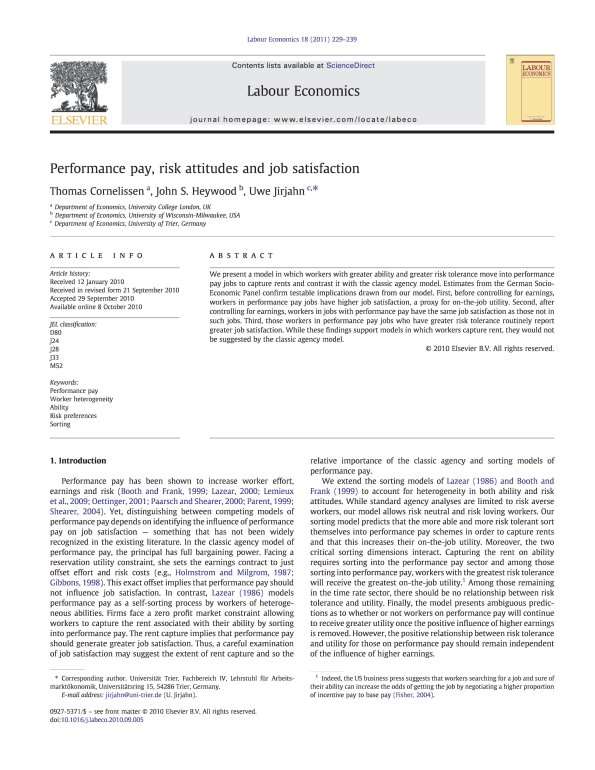
2.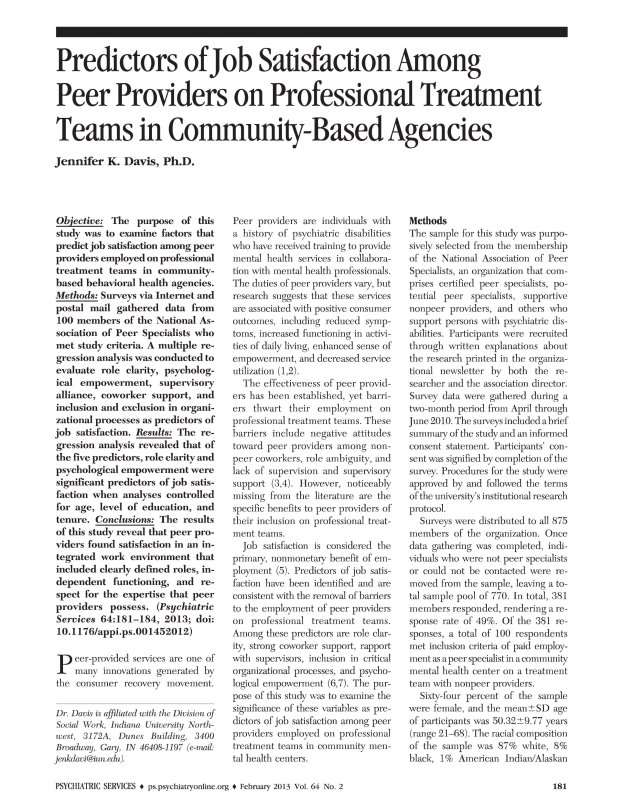
3.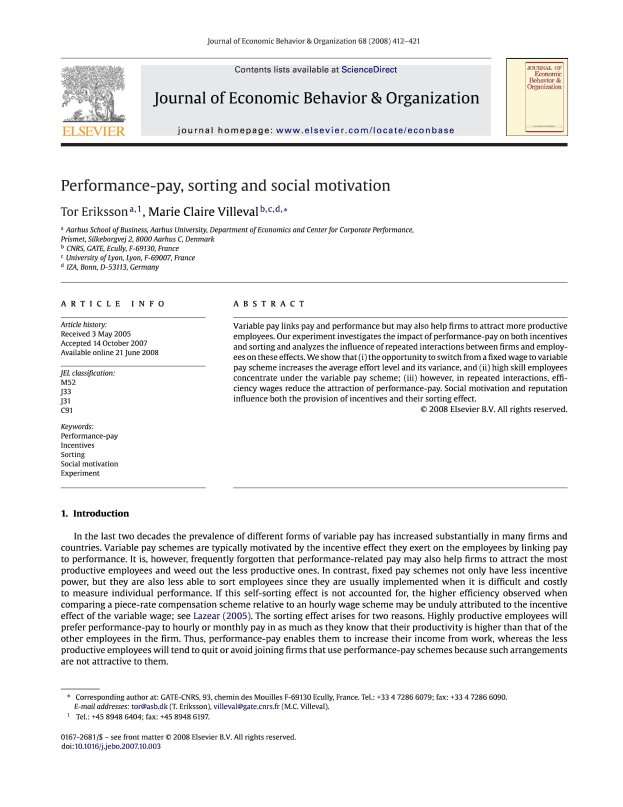
4.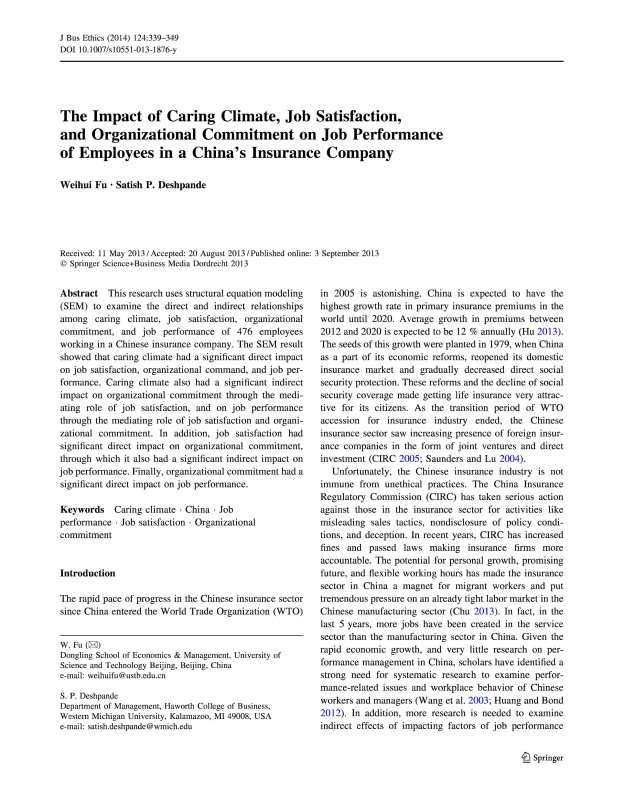
5.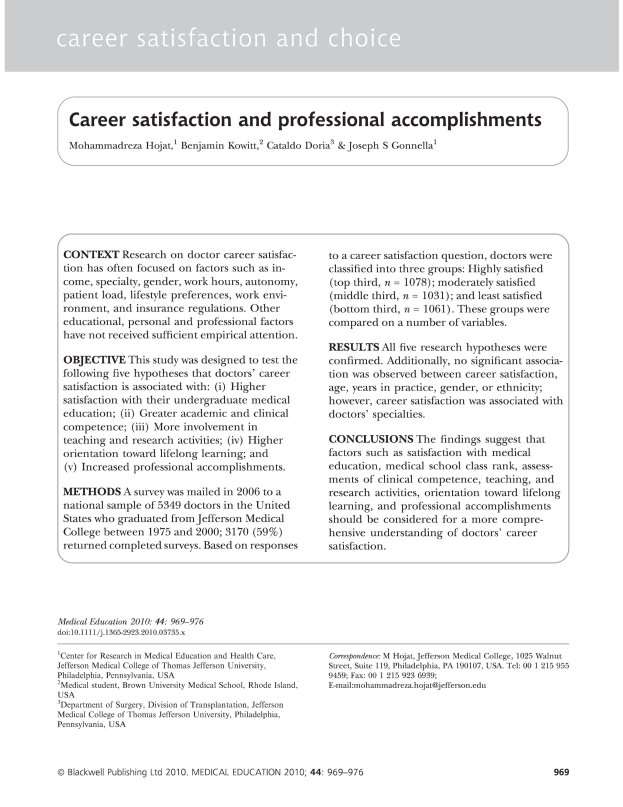
6.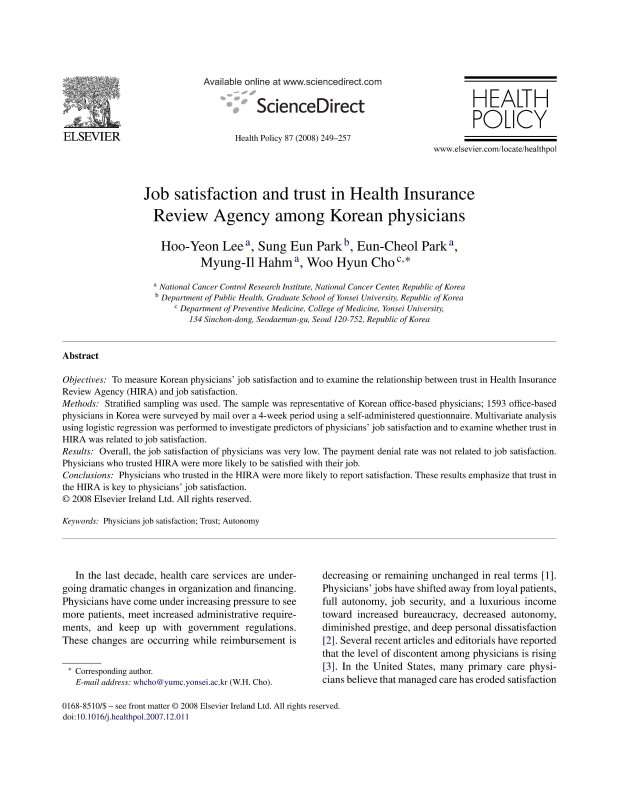
7.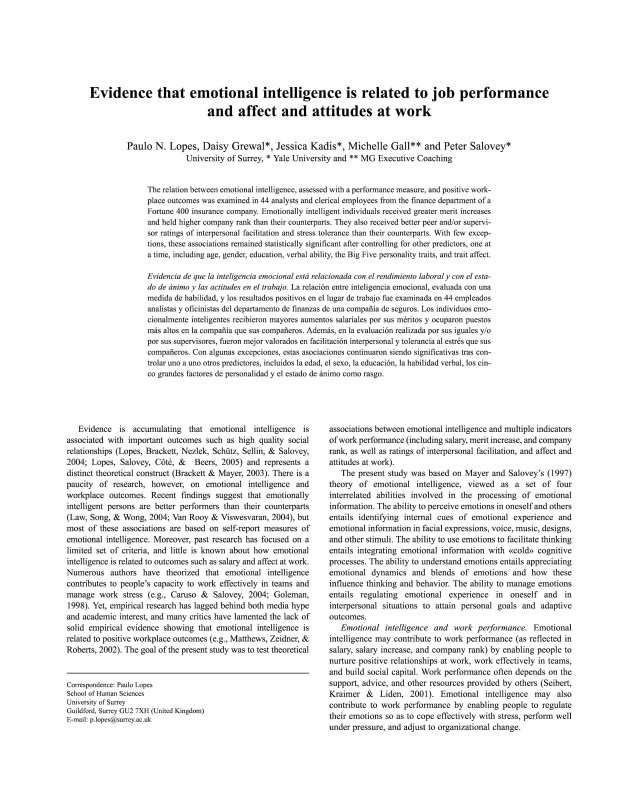
8.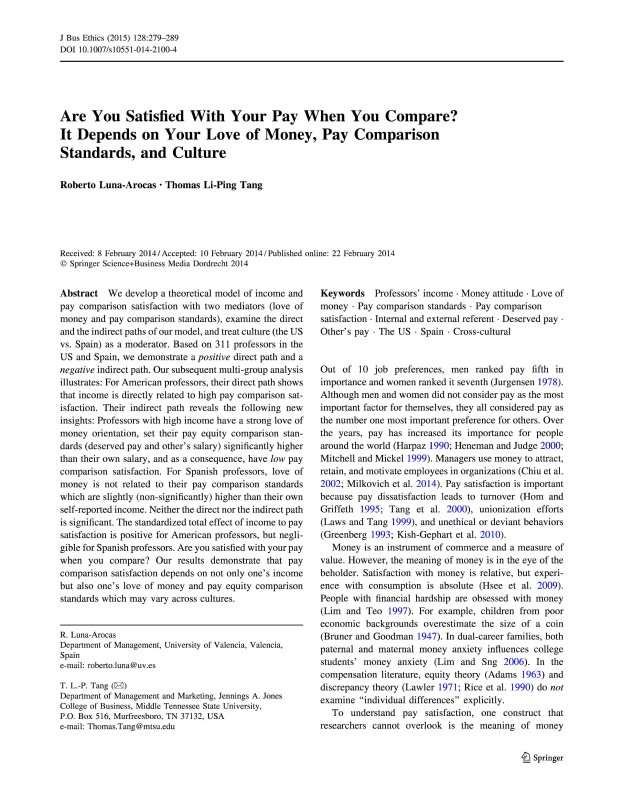
9.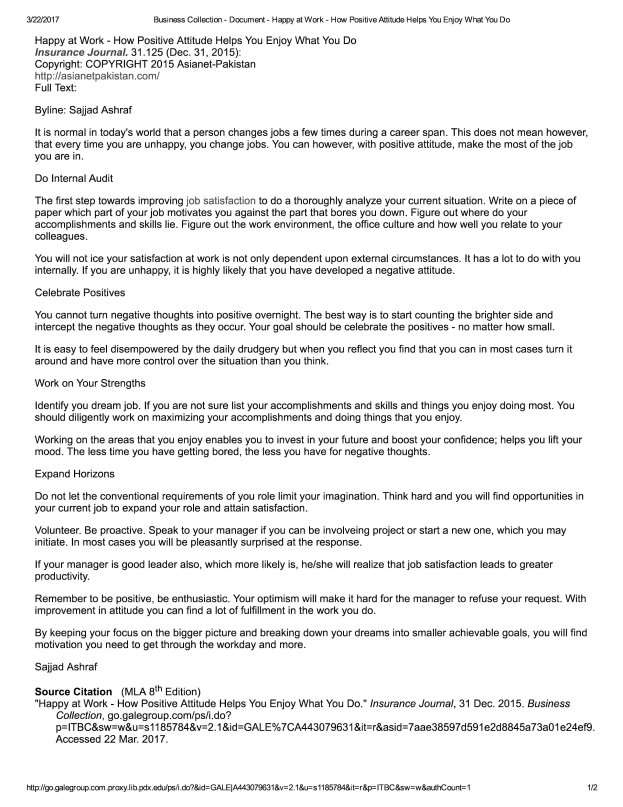
10.